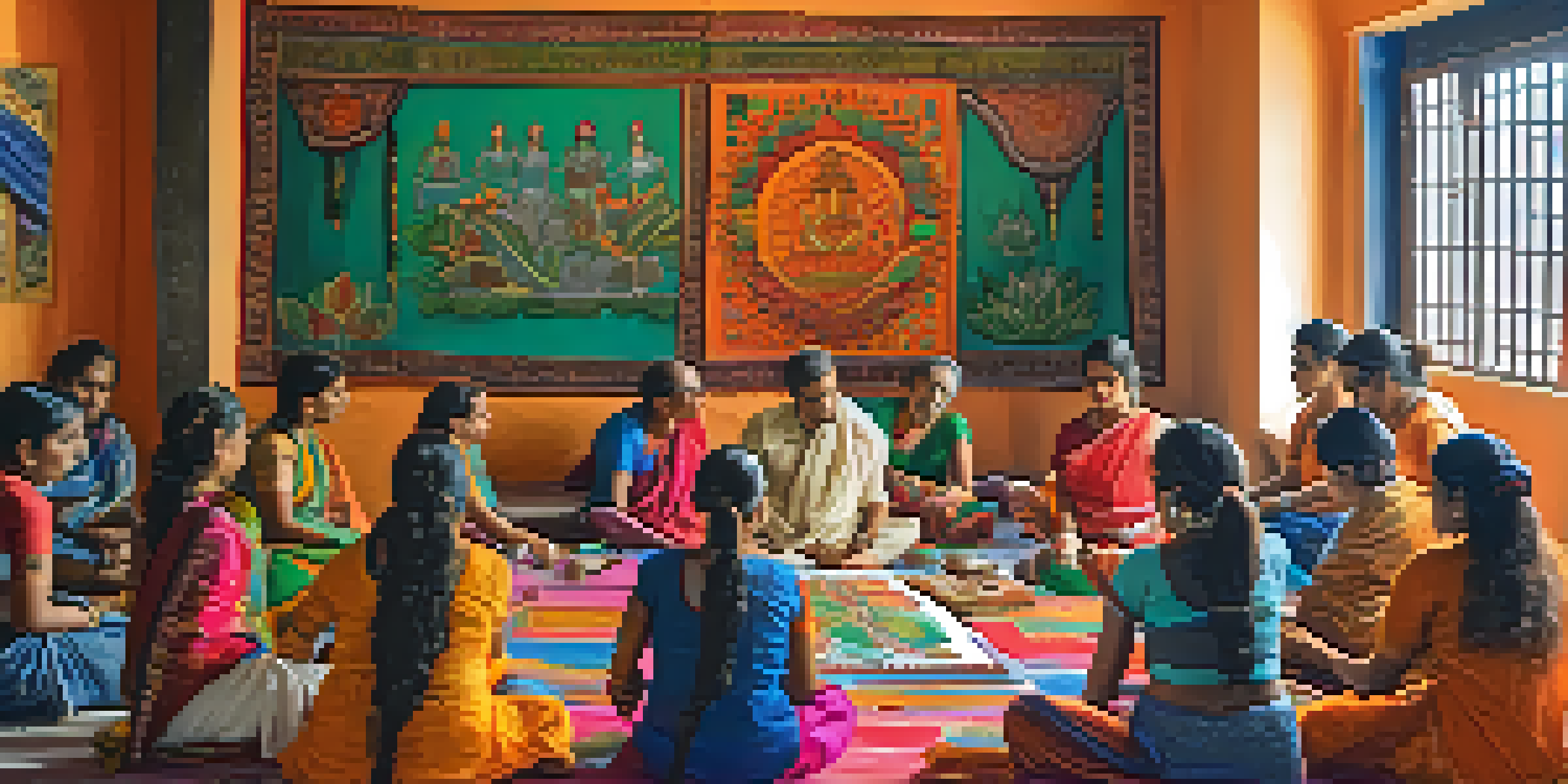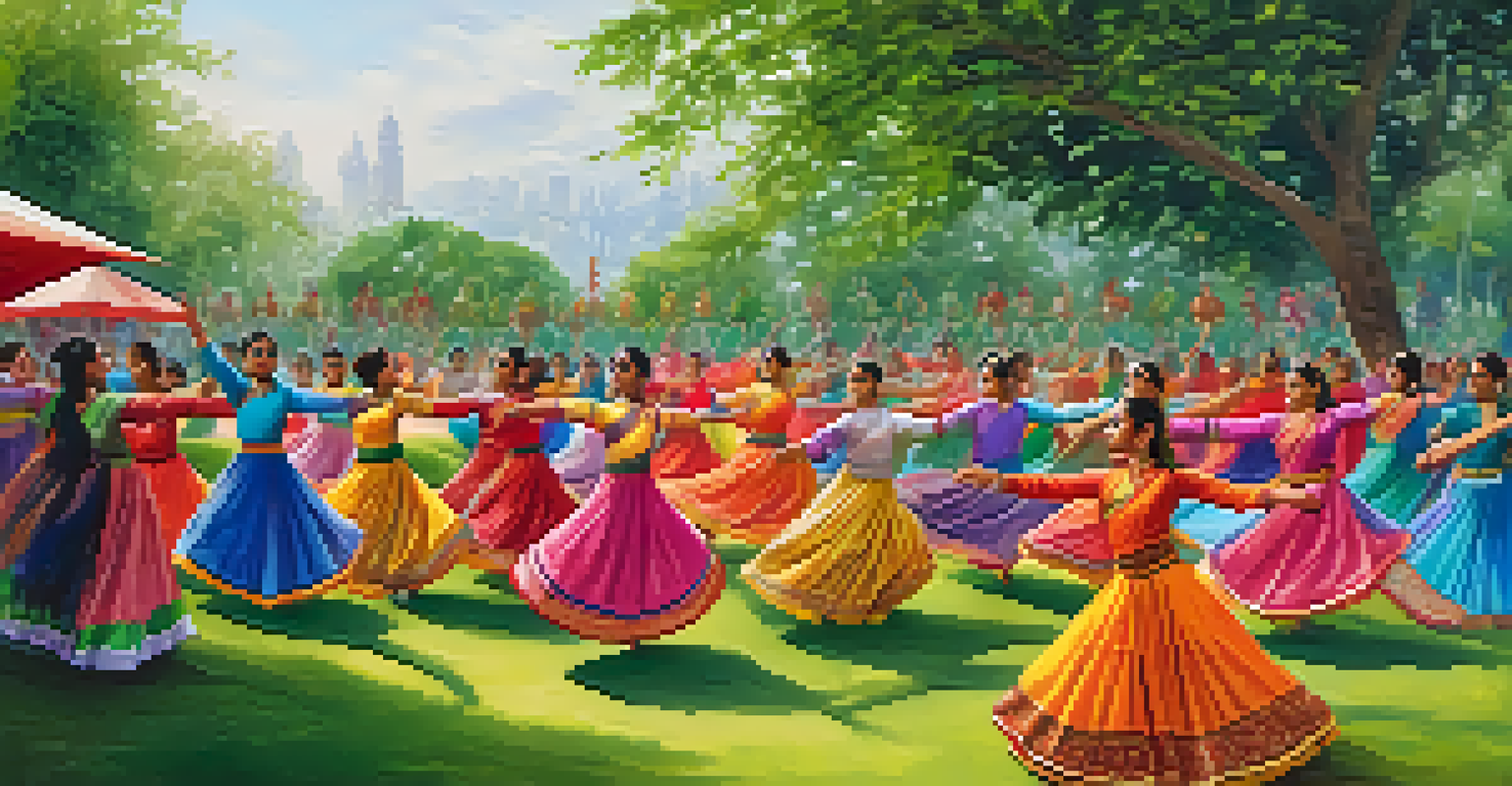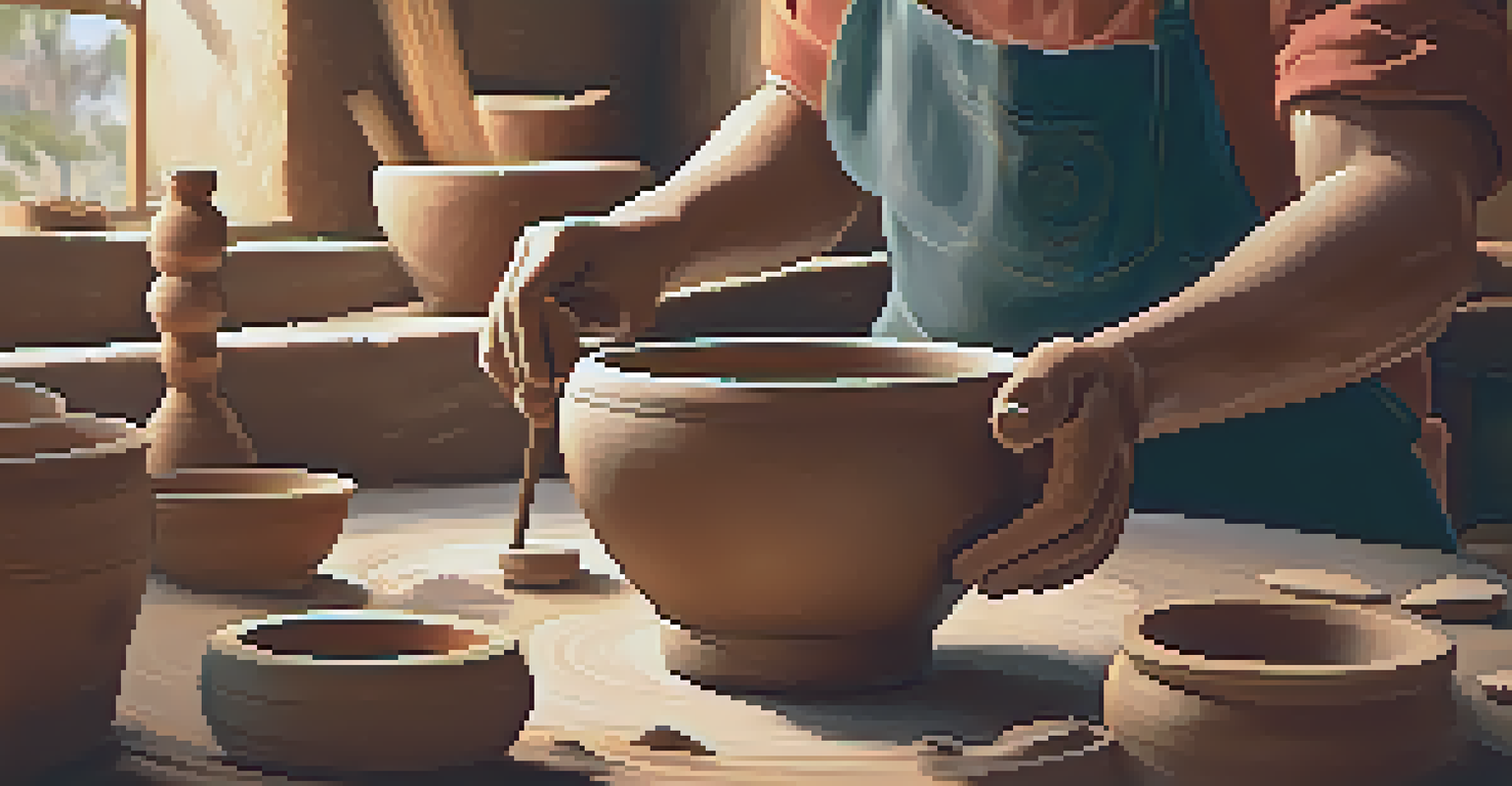The Role of Cultural Workshops in Preserving Indian Art

Understanding Cultural Workshops and Their Purpose
Cultural workshops are interactive sessions that focus on various art forms, traditions, and practices. They serve as a platform for sharing knowledge, skills, and stories that define a culture. In India, these workshops are vital in keeping traditional art alive, allowing participants to learn from skilled artisans and practitioners.
Art is the most beautiful of all lies.
The essence of these workshops lies in their hands-on approach, where participants engage directly with the art. This involvement fosters a deeper connection to the culture and its heritage. By immersing themselves in the creative process, attendees not only grasp the techniques but also appreciate the stories and histories behind them.
Overall, cultural workshops act as a bridge between generations, ensuring that age-old traditions are passed down. They play a pivotal role in community building, uniting people with a shared interest in preserving their cultural identity.
The Significance of Indian Art in Cultural Identity
Indian art is a vibrant tapestry woven from diverse influences, including religion, history, and geography. Each art form, whether it's classical dance, painting, or pottery, tells a unique story that reflects the cultural identity of its region. This richness highlights the importance of safeguarding these practices for future generations.

Art is not just an aesthetic pursuit in India; it’s a means of expression that encapsulates the philosophy and values of society. For instance, traditional forms like Madhubani painting or Kathak dance are deeply rooted in local customs and spirituality. Preserving these forms through workshops helps maintain the integrity of these cultural narratives.
Cultural Workshops Preserve Heritage
These interactive sessions help keep traditional art forms alive by teaching skills and sharing stories.
Cultural workshops serve as a crucial reminder of the power of art in shaping identity. They help participants understand their roots, fostering pride and a sense of belonging in a rapidly globalizing world.
How Workshops Foster Skill Development and Innovation
Cultural workshops not only aim at preserving traditional art forms but also encourage innovation. Participants, often from diverse backgrounds, bring new perspectives and ideas that can breathe fresh life into age-old practices. This blend of tradition and modernity can lead to exciting new art forms that appeal to contemporary audiences.
Culture is the widening of the mind and of the spirit.
In these workshops, seasoned artisans share their expertise, teaching intricate techniques while also encouraging experimental approaches. This mentorship fosters a creative environment where learners feel empowered to explore their artistic identities. They can adapt traditional methods to suit modern aesthetics or themes, making the art relevant today.
Ultimately, the focus on skill development within these workshops prepares a new generation of artists. As they hone their craft, they contribute to the evolution of Indian art, ensuring it remains dynamic and vital.
Community Engagement: Building Bonds Through Art
Cultural workshops often bring together individuals from varying backgrounds, creating a sense of community. This shared experience fosters relationships that might not have otherwise developed. Participants bond over their love for art, exchanging ideas and experiences that enrich their understanding of each other’s cultures.
By engaging with local communities, these workshops help to strengthen social ties. Participants often collaborate on projects, which can lead to lasting friendships and partnerships. This sense of belonging significantly enhances the overall experience, making art a communal endeavor rather than an individual pursuit.
Art Fosters Community Bonds
Cultural workshops bring together diverse individuals, creating connections through shared artistic experiences.
Moreover, community engagement through workshops can promote cultural tourism. When locals and visitors come together to appreciate and create art, it boosts local economies and showcases the richness of Indian culture.
Promoting Cultural Awareness Through Educational Initiatives
Cultural workshops often serve as educational platforms, promoting awareness about various art forms. By providing insights into the history and significance of different Indian arts, these workshops inspire appreciation among participants. This awareness is crucial for fostering respect and understanding of diverse cultural practices.
Schools and institutions frequently collaborate with cultural organizations to implement workshops as part of their curriculum. This integration not only enriches students’ learning experiences but also instills cultural pride from a young age. Children who engage in these activities are more likely to carry forward the values and traditions they've learned.
In this way, cultural workshops act as vital educational initiatives, nurturing a generation that values and respects its heritage. They cultivate an informed audience that becomes advocates for the preservation of Indian art.
Challenges Faced by Cultural Workshops Today
Despite their importance, cultural workshops face significant challenges in today’s fast-paced world. One major hurdle is the diminishing interest among younger generations, who may gravitate towards more modern forms of entertainment. This shift poses a risk to the preservation of traditional art forms, making it essential for workshops to adapt their approach.
Additionally, funding and resources can be a concern for many cultural organizations. Without sufficient financial support, these workshops may struggle to attract skilled artisans or provide quality materials for participants. This limitation can impact the overall experience and effectiveness of the workshops.
Education Promotes Cultural Awareness
Workshops serve as educational platforms, inspiring respect and appreciation for India's rich artistic heritage.
To counter these challenges, innovative strategies are essential. Collaborations with schools, local governments, and cultural institutions can help secure resources and foster interest in traditional arts among youth.
The Future of Cultural Workshops in Indian Art Preservation
As the world continues to change, cultural workshops must evolve to remain relevant. Embracing technology and utilizing digital platforms can help reach a broader audience, especially younger individuals. Online workshops and virtual exhibitions can introduce traditional arts to those who may not have access to in-person sessions.
Moreover, integrating contemporary themes with traditional art forms can spark interest and engagement. By showcasing how these art forms can be relevant in modern contexts, workshops can attract a diverse group of participants. This fusion can lead to innovative art that respects tradition while embracing new ideas.

Looking ahead, the role of cultural workshops will be pivotal in ensuring the survival of Indian art. By adapting to changing times while remaining true to their core mission, these workshops can inspire future generations to appreciate and preserve their rich cultural heritage.